Blues Reviews
Apr/May 2022
Bob Stroger & The Headcutters
That’s My Name
Delmark CD
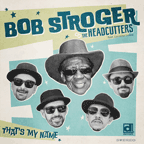 Ninety-one year old first-call bassist and singer/songwriter Bob Stroger has had a resplendent musical career, initially working for fifteen years with Eddie King’s band and then backing Otis Rush in the late 1970s and 1980s. He toured Europe with Rush and played on two of his albums (Live in Europe and Lost In The Blues) as well as working, with drummer Odie Payne, as the rhythm section for European promoter Horst Lippman, whose productions included the various American Blues Folk Festivals, before settling in as a Delmark session musician on more than thirty albums supporting the likes of Jimmy Rogers, Eddie Clearwater, Buster Benton, Sunnyland Slim, Homesick James, Snooky Pryor, Louisiana Red and Mississippi Heat among others. This is his first Delmark album as a leader. The Headcutters, comprised of harmonica ace Joe Marhofer, guitarist Ricardo Maca, bassist Arthur ‘Catuto’ Garcia and drummer Leandro ‘Cavera’ Barbeta, are one of Brazil’s most notable blues bands with their timbres and sounds from the 1950s and 1960s following in the footsteps of the legendary Chicago blues labels. In 2014, on a Stateside tour, they really woke folks up at both Helena, Arkansas’ King Biscuit Blues Festival and the Pinetop Perkins Blues Festival in Clarksdale, Mississippi—the record of the entire tour is the subject of the documentary Walkin’ In The USA, released in 2017 and available on YouTube. Picks among the set’s eight covers begin with a couple of slow grinding Jr. Parker songs (“What Goes On In The Dark” and the disconsolate “Stranded in St. Louis”) along with a bouncy recall of Eugene Church’s classic “Pretty Girls Everywhere” while Jay McShann’s “Keep Your Hands Off Her” jumps along nicely and Big Bill Broonzy’s philosophical contemplation “Just A Dream” along with Casey Bill Weldon’s chestnut “Move to the Outskirts of Town” are perfect vehicles for Stroger’s wearily expressive, deeply moving vocals. I’m also impressed by a couple of Stroger’s five originals—the pleading “Come on Home” and the haunting melodrama “Something Strange.” I also can’t say enough good things about the superb musicianship of the Headcutters and the two guest artists, keyboardist Luciano Leaes and saxophonist Braion Johnny, who appear throughout this long overdue release. Long live Bob Stroger!—Gary von Tersch
Ninety-one year old first-call bassist and singer/songwriter Bob Stroger has had a resplendent musical career, initially working for fifteen years with Eddie King’s band and then backing Otis Rush in the late 1970s and 1980s. He toured Europe with Rush and played on two of his albums (Live in Europe and Lost In The Blues) as well as working, with drummer Odie Payne, as the rhythm section for European promoter Horst Lippman, whose productions included the various American Blues Folk Festivals, before settling in as a Delmark session musician on more than thirty albums supporting the likes of Jimmy Rogers, Eddie Clearwater, Buster Benton, Sunnyland Slim, Homesick James, Snooky Pryor, Louisiana Red and Mississippi Heat among others. This is his first Delmark album as a leader. The Headcutters, comprised of harmonica ace Joe Marhofer, guitarist Ricardo Maca, bassist Arthur ‘Catuto’ Garcia and drummer Leandro ‘Cavera’ Barbeta, are one of Brazil’s most notable blues bands with their timbres and sounds from the 1950s and 1960s following in the footsteps of the legendary Chicago blues labels. In 2014, on a Stateside tour, they really woke folks up at both Helena, Arkansas’ King Biscuit Blues Festival and the Pinetop Perkins Blues Festival in Clarksdale, Mississippi—the record of the entire tour is the subject of the documentary Walkin’ In The USA, released in 2017 and available on YouTube. Picks among the set’s eight covers begin with a couple of slow grinding Jr. Parker songs (“What Goes On In The Dark” and the disconsolate “Stranded in St. Louis”) along with a bouncy recall of Eugene Church’s classic “Pretty Girls Everywhere” while Jay McShann’s “Keep Your Hands Off Her” jumps along nicely and Big Bill Broonzy’s philosophical contemplation “Just A Dream” along with Casey Bill Weldon’s chestnut “Move to the Outskirts of Town” are perfect vehicles for Stroger’s wearily expressive, deeply moving vocals. I’m also impressed by a couple of Stroger’s five originals—the pleading “Come on Home” and the haunting melodrama “Something Strange.” I also can’t say enough good things about the superb musicianship of the Headcutters and the two guest artists, keyboardist Luciano Leaes and saxophonist Braion Johnny, who appear throughout this long overdue release. Long live Bob Stroger!—Gary von Tersch
Peter Veteska & Blues Train
So Far So Good
Blue Heart Records
 The prolific Peter Veteska returns this year with his sixth release since 2014, So Far So Good. The guitarist/singer/songwriter and New York Blues Hall of Fame inductee powers through the twelve-song album of mostly originals with his band Blues Train: the solid rhythm section of Alex D’Agnese (drums) and Coo Moe Jhee (bass) along with keyboardist Jeff Levine. On So Far So Good, Veteska and Co. turn to a purer blues approach as opposed to previous releases that were blues-based but incorporated jazz and rock influences. The album kicks off with the slamming “Done with Bad Luck,” where Gary Neuwirth’s harmonica solo leads to a breakdown with Levine’s B3 organ, Jhee’s bass and Veteska’s guitar trading two bars each leading to a screaming B3 solo. The hard-hitting opener is followed by the softer “I’ve Got the Blues This Morning,” carried by Jeff Levine’s upright piano. The highlight of this track is Veteska squeezing some mighty righteous tones out of his acoustic. The shuffle “I Miss You So” features Veteska and vocalist Jenny Barnes trading lines. The opening cell phone ring and the lyric “you’ve been ghosting me” place this track squarely in the “here and now” but sonically and musically the whole album is organic and devoid of modern devices. Longtime Veteska collaborator Joseph DeMaio is once again at the helm and co-produced (with Peter V.), recorded and mixed the album at the Long Branch, NJ Shorefire Studio. A highlight is a cover of Guitar Slim’s “You Give Me Nothing But the Blues” featuring Barnes and Veteska trading barbs amid a strong horn section chart. Harmonica player Mikey Junior is a major contributor, lending his strong licks to half of the songs on the album. Junior is masterful on James Cotton’s “Young Bold Women,” which is a total gas, switching back and forth from rhumba to a hard hitting swing, with vocalist Chuck Lambert and Veteska sparring over the hook line on the song’s coda, culminating with Peter’s epic solo. A constant throughout the album is Peter Veteska’s masterful Stratocaster playing, always strong and tasteful, and constantly bringing the energy level up a few more notches. So Far So Good is another solid, quality blues record from Peter Veteska & Blues Train and thoroughly enjoyable from start to finish. We are starting to get spoiled from this crew! – Bob Monteleone
The prolific Peter Veteska returns this year with his sixth release since 2014, So Far So Good. The guitarist/singer/songwriter and New York Blues Hall of Fame inductee powers through the twelve-song album of mostly originals with his band Blues Train: the solid rhythm section of Alex D’Agnese (drums) and Coo Moe Jhee (bass) along with keyboardist Jeff Levine. On So Far So Good, Veteska and Co. turn to a purer blues approach as opposed to previous releases that were blues-based but incorporated jazz and rock influences. The album kicks off with the slamming “Done with Bad Luck,” where Gary Neuwirth’s harmonica solo leads to a breakdown with Levine’s B3 organ, Jhee’s bass and Veteska’s guitar trading two bars each leading to a screaming B3 solo. The hard-hitting opener is followed by the softer “I’ve Got the Blues This Morning,” carried by Jeff Levine’s upright piano. The highlight of this track is Veteska squeezing some mighty righteous tones out of his acoustic. The shuffle “I Miss You So” features Veteska and vocalist Jenny Barnes trading lines. The opening cell phone ring and the lyric “you’ve been ghosting me” place this track squarely in the “here and now” but sonically and musically the whole album is organic and devoid of modern devices. Longtime Veteska collaborator Joseph DeMaio is once again at the helm and co-produced (with Peter V.), recorded and mixed the album at the Long Branch, NJ Shorefire Studio. A highlight is a cover of Guitar Slim’s “You Give Me Nothing But the Blues” featuring Barnes and Veteska trading barbs amid a strong horn section chart. Harmonica player Mikey Junior is a major contributor, lending his strong licks to half of the songs on the album. Junior is masterful on James Cotton’s “Young Bold Women,” which is a total gas, switching back and forth from rhumba to a hard hitting swing, with vocalist Chuck Lambert and Veteska sparring over the hook line on the song’s coda, culminating with Peter’s epic solo. A constant throughout the album is Peter Veteska’s masterful Stratocaster playing, always strong and tasteful, and constantly bringing the energy level up a few more notches. So Far So Good is another solid, quality blues record from Peter Veteska & Blues Train and thoroughly enjoyable from start to finish. We are starting to get spoiled from this crew! – Bob Monteleone
Sandy Haley
Feels Like Freedom
www.sandyhaleymusic.com
 Sandy Haley is a Detroit-born transplant that brings her soul and blues roots to the Los Angeles area. She is a bright and effervescent singer-songwriter, with a big voice and a spiritually-charged personality to match. She is a great storyteller that appears to sing from the perspective of every man or woman. Her songs are cinematic clips of life that most folks can certainly absorb.
Sandy Haley is a Detroit-born transplant that brings her soul and blues roots to the Los Angeles area. She is a bright and effervescent singer-songwriter, with a big voice and a spiritually-charged personality to match. She is a great storyteller that appears to sing from the perspective of every man or woman. Her songs are cinematic clips of life that most folks can certainly absorb.
Haley began her professional career touring as a backup singer with Shaun Murphy of Little Feat and Bob Seger fame. The radiant blonde crooner has also toured and regularly performed, with John Mayall, Tommy Castro and the Painkillers, Coco Montoya, Chris Cain and a host of others.
Here Haley steps center stage into this tight and succinct five-song EP. First of all, she’s got a murderer’s row of first call musicians such as Teddy Andreadis and Jeff Parks (keyboards), Pat McClure and Johnny Lee Schell (guitars), Tony Braunagel (producer, drums & percussion), Ricky Cortes, Reggie McBride and Dave DeLeon (bass guitar), Joe Sublett (saxophone), Nick Lane (trombone), Les Lovitt (trumpet) and Maxayn Lewis, Kudisan Kai Regalto and Melodye Perry (backup vocals). This ensemble smoothly and securely gets the job done. But, make no mistake, Haley is leading the ship and delivers at every turn.
The title track, “Feels Like Freedom,” opens with a nice and relaxing airy and atmospheric feel. It is a heartfelt song that radiates praise for friends, family and the ideal freedom to live one’s life in love and light. Haley’s soulful words emanate from an authentic and comforting place. Her vocals soar, with the assistance of Sublett’s cool and Junior Walker-like tenor sax work. “Never Sleep Your Way to the Middle” is a tongue-in-cheek account of an office romance that serves as a cautionary tale. It features a boogie rock and blues beat, with full horns and raging leads from Schell. Essentially Haley’s message to women of all ages is don’t let an office affair—especially with a married man—ruin your life. Her words impart, “You gotta play it straight….Don’t give up on your dreams,” and “He is nowhere near the top….You gotta know when to say stop.” Perhaps that theme of holding out for an authentic man continues with “Love Me Right.” Basically, Haley here is standing tall and doesn’t wanna be some man’s side hustle or backdoor woman. The tune is set to a slow and moody tempo and sizzles by way of Lane’s pensive trombone solo. “Run for Shelter” consists of a good funky groove and ecstatic interplay between bass and drums. Haley offers up a strong gospel feel in a tale of looking for love while running away from life’s challenges and pain. The backing vocals in concert with spirited sax and organ work make this a signature track in the set list. On a more lighthearted note, “Dirty Dog” ties the disc with a catchy exclamatory bow. Keyboardist Andreadis steps out on harmonica and brings the house down. This seems to potentially be a good live tune, with the tag, “Where you been you dirty dog?” So, if your man is out doing something shady and disrespecting you, be warned! Sandy Haley’s got your back!—Eric Harabadian
Markey Blue Ric Latina Project
Jumpin’ the Broom
soul O sound Records
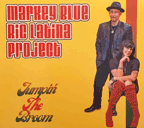 Session guitarist Ric Latina and vocalist Jeanette Markey were originally paired to co-write songs together. 2022 marks ten years of their fruitful partnership and as leaders of the Nashville recording and touring band The Markey Blue Ric Latina Project. Jumpin’ the Broom is in fact the first release since the couple tied the knot. Their previous recordings have boasted some serious television credits, including ABC’s “Grey’s Anatomy,” Amazon’s “Bosch,” TNT’s “Claws” and even the Cartoon Network’s “Rick and Morty”.
Session guitarist Ric Latina and vocalist Jeanette Markey were originally paired to co-write songs together. 2022 marks ten years of their fruitful partnership and as leaders of the Nashville recording and touring band The Markey Blue Ric Latina Project. Jumpin’ the Broom is in fact the first release since the couple tied the knot. Their previous recordings have boasted some serious television credits, including ABC’s “Grey’s Anatomy,” Amazon’s “Bosch,” TNT’s “Claws” and even the Cartoon Network’s “Rick and Morty”.
Jumpin’ the Broom is a collection of ten originals that stays in the contemporary blues style with a big Memphis soul influence. Markey Blue’s sultry vocals are mixed front and center and Ric Latina’s guitar work (he plays all the guitar tracks) is always supportive and tasteful. When Latina steps out front his solos are on point with great tone. The rhythm section of bassist Randy Coleman and drummer Dave Northrup back all the tracks along with keyboardist Shannon Wickline, who mostly adds soulful B3 organ. Horns dress up nicely many of the tunes, mostly supplied by Chris West. A highlight is “Lowdown Voodoo Woman,” with some nice 70’s soul touches like flute and a cool distorted guitar part (or is it a bari sax?). Jumpin’ the Broom, which was produced by Latina, is a polished, well-recorded collection of well-crafted songs showcasing the talents of the two principals: Markey Blue and Ric Latina.—Bob Monteleone
John Mayall
The Sun Is Shining Down
Forty Below Records 2022
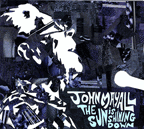 Look him up on the Internet, and then be prepared to read for a long time. John Mayall is justifiably known as “the Godfather of the Blues.” Over a six-decade career, he has established an irrefutable legacy as a singer, multi-instrumentalist, songwriter, bandleader, live performer, and recording artist. He is a member of the Blues Hall of Fame. His bands have served as nurturing ground for such eminent musicians as guitarists Peter Green, Eric Clapton, Harvey Mandel, Mick Taylor, Buddy Whittington, Jon Mark, and most recently Carolyn Wonderland; saxophonist Johnny Almond; violinist Sugarcane Harris, bassist Larry Taylor…why go on? The list is so long.
Look him up on the Internet, and then be prepared to read for a long time. John Mayall is justifiably known as “the Godfather of the Blues.” Over a six-decade career, he has established an irrefutable legacy as a singer, multi-instrumentalist, songwriter, bandleader, live performer, and recording artist. He is a member of the Blues Hall of Fame. His bands have served as nurturing ground for such eminent musicians as guitarists Peter Green, Eric Clapton, Harvey Mandel, Mick Taylor, Buddy Whittington, Jon Mark, and most recently Carolyn Wonderland; saxophonist Johnny Almond; violinist Sugarcane Harris, bassist Larry Taylor…why go on? The list is so long.
Mayall is now 88 years old and has just announced that his touring will be curtailed henceforth due to the Covid pandemic. During his octogenarian years he has been revitalized in association with Eric Corne and Forty Below Records and has released an album almost annually. This latest, recorded in December 2019 just before the pandemic hit, reprises the format of 2019’s “Nobody Told Me”: a few originals, mostly covers, his seasoned rhythm section of drummer Jay Davenport and bassist Greg Rzab, and multiple distinguished guests. The result is ten tracks of mainly standard twelve bar blues.
Violinist Scarlet Rivera is present on two tracks. On the Mayall original “Got to Find a Better Way,” delineating a stressed relationship, her fiddle meshes prettily with Mayall’s electric piano, as it also does on another original, “Deep Blue Sea,” this time describing a blissful relationship. Chicago guitarist Melvin Taylor also appears twice. On the opening track, “Hungry and Ready,” he deals out stinging notes while Mayall sings of enthusiasm and perseverance in the face of setbacks and affords some of his harmonica expertise; a horn section also fits in well. Later Taylor and Mayall deliver a nice rendition of the classic “Driving Wheel,” a little slower and more subdued than the Paul Butterfield Band version.
Noted ukulele master Jake Shimabukuro makes an appearance on “One Special Lady”; is he playing electric guitar, or making an electrified ukulele sound like one? I don’t know, but it sounds good! Guitar maestro Buddy Miller (frequent collaborator with Emmylou Harris) is the lead instrumentalist on the cover of “I’m As Good As Gone,” penned by another 88 year old bluesman, Bobby Rush, and Mike Campbell of the Heartbreakers helps to introduce a funk element in Bernard Allison’s “Chills and Thrills.”
Of the guest performers, the only returnee from the last album is Carolyn Wonderland, whose lyrical lead on the title tune is abetted by swirling organ (apparently played by Mayall; no other keyboardist is credited on the album). It’s an optimistic capstone to the set, with Mayall singing “It’s been a long, long journey/And I ain’t got time to quit/Things are goin’ so good so far/Not bad for some old Brit.” Not bad at all…and Mayall’s vocal, here and throughout the album, although not as smooth or strong as it was ten – or fifty – years ago, is up to the task.
The only track sans guest is “A Quitter Never Wins,” but Mayall, Davenport, and Rzab handle it deftly, with Mayall again wailing on harmonica, adding organ, and apparently also responsible for the guitar licks.
More solid blues from John Mayall. Let’s hope that he joins Honeyboy Edwards, Robert Lockwood Jr., Jimmy Johnson, and Pinetop Perkins, who all produced music for our pleasure into their nineties.—Steve Daniels
John Mayall
The First Generation: 1965-1974
Snapper Music/Madfish
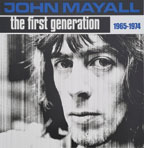 God bless the Brits! Unquestionably, many of the UK pop, rock and blues artists have made a career out of taking traditional music and injecting it with a whole new angle and energy. Cream’s revamped cover of Robert Johnson’s “Crossroads,” Alvin Lee & Ten Years After’s “Good Morning Little Schoolgirl” and key selections by Savoy Brown come to mind. But, perhaps, one of the greatest interpreters and innovators of British blues and beyond is, no doubt, the living legend himself John Mayall. The blues-rock svengali is well into his eighth decade on the planet and is still going strong.
God bless the Brits! Unquestionably, many of the UK pop, rock and blues artists have made a career out of taking traditional music and injecting it with a whole new angle and energy. Cream’s revamped cover of Robert Johnson’s “Crossroads,” Alvin Lee & Ten Years After’s “Good Morning Little Schoolgirl” and key selections by Savoy Brown come to mind. But, perhaps, one of the greatest interpreters and innovators of British blues and beyond is, no doubt, the living legend himself John Mayall. The blues-rock svengali is well into his eighth decade on the planet and is still going strong.
The good folks at Snapper distribution and their Madfish imprint have built a solid reputation with presenting the best in recorded collectors’ editions and artist box sets. And this particular package is the absolute mother lode for Mayall fans and completists alike. This is a package that has been handled and assembled with passion, an attention to detail and tender loving care.
This recorded and literary assemblage takes you on a journey from the very beginning of Mayall’s career, with his first album on Decca recorded live at Klooks Kleek, called “John Mayall Plays John Mayall,” to his 1974 studio release titled “The Latest Edition.” There are 35 CDs in this set that, in addition to re-mastered and dutifully replicated copies of all the studio and live original releases that came out on Decca and Polydor, you get rare singles and unreleased live concerts from the BBC, The Fillmore West and various European dates and festivals.
As you attempt to navigate through the plethora of recorded material it is truly awesome to witness the growth of an artist in, literally, one fell swoop. There are so many magic moments to choose from. But, it is interesting to hear how Mayall’s first incarnation of his band The Bluesbreakers emerged in 1964/’65 as kind of a hard boppin’ and bluesy Beatles. There was a certain “British Invasion”-like quality to the early material. And then you hear how Mayall’s Bluesbreaker concept expanded with the times as band personnel and production quality evolved.
Historically, John Mayall’s early Bluesbreaker recordings like “A Hard Road,” “Bare Wires” “Crusade” and the famous self-titled album (with Eric Clapton reading a ‘Beano’ comic book on the cover) made early impressions with audiences for not only spotlighting the guitar acumen of, at the time, ex-Yardbird guitarist Clapton, but also shining the light on guitarists Mick Taylor, Peter Green, bassist John McVie and drummers Keef Hartley and Anysley Dunbar.
As you dig more into Mayall’s recorded history during the 1965-1974 period you see how, not only was he a prolific songwriter and multi-instrumentalist, but, in addition to leading all these various ensembles, he designed a number of the album covers, packages and wrote the liner notes. He was, and is, an auteur of the highest order.
Mayall was also an early progenitor of meshing jazz-rock and blues, experiments with folk sounds and integrated instruments like nine-string guitar into the mix. You get all that and more in this exemplary box set.
Also included is an exquisitely detailed 167-page hard bound coffee table book filled with beautiful color and black and white photos of band members, Mayall family shots, album covers, liner notes, a full discography and press clips. Additional ephemera includes two full-size color posters, an autographed black and white Mayall stage photo, a faithfully reproduced press kit from the British bluesman’s first record and tour and an extensive soft bound book featuring 1968-1970 clippings from the pages of John Mayall’s fan club newsletter. And the entire package is housed in an attractive and sturdy dark blue box.
Needless to say, this is an absolute treasure trove of riches for John Mayall fans and anyone that wants to trace the history of British blues and modern rock as well.—Eric Harabadian
Brock Davis
A Song Waiting To Be Sung
Raintown Records CD
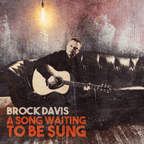 Americana singer/songwriter Brock Davis currently divides his time between Santa Cruz, California and Nashville, Tennessee, but he grew up in a small mill town near Vancouver, Canada. His previous releases have earned critical acclaim—the Vancouver Arts Magazine opined: “Brock’s powerful, authoritative voice brings to life the honest and intense emotions within the heartfelt lyrics.” His latest solo album is a cathartic mash-up of Americana and Indie Country as Brock faces up to childhood trauma, the end of an unsustainable marriage as well as years “going 100 miles an hour running a Silicon Valley start-up,” as the press notes put it. Particular “hit the nail on the headers” include a reflective, divorce-themed “I Choose Love,” the Dylan-esquely poignant title track about Brock’s son and an exploration of love and politics titled “Bullets And Blood,” a pensive song where Brock, with his EXPRESSIVE, low-register vocal, effectively chronicles a decades-long love story between a gay male couple set against a combustible homophobic backdrop in the South. A couple others that caught my ear are “All Free” and “Second Time Around.” The former was composed during the summer of 2020, at the height of the Black Lives Matter protests, and comments frankly on the reality of racial injustice with the chorus featuring the goose-bump inducing refrain: If we’re not all free/ Then we’re not free at all while the latter is an autobiographical, country-hued ballad about rekindling an old flame. Brock’s music, full of sumptuous finger-style acoustic guitar, resonant Telecasters, galvanizing bursts of B3 organ and homesick slide guitar circumscribes the rustical panorama of folk and country music along with the unbridled energy of unadulterated rock ‘n’ roll. Plenty to enjoy here!—Gary von Tersch
Americana singer/songwriter Brock Davis currently divides his time between Santa Cruz, California and Nashville, Tennessee, but he grew up in a small mill town near Vancouver, Canada. His previous releases have earned critical acclaim—the Vancouver Arts Magazine opined: “Brock’s powerful, authoritative voice brings to life the honest and intense emotions within the heartfelt lyrics.” His latest solo album is a cathartic mash-up of Americana and Indie Country as Brock faces up to childhood trauma, the end of an unsustainable marriage as well as years “going 100 miles an hour running a Silicon Valley start-up,” as the press notes put it. Particular “hit the nail on the headers” include a reflective, divorce-themed “I Choose Love,” the Dylan-esquely poignant title track about Brock’s son and an exploration of love and politics titled “Bullets And Blood,” a pensive song where Brock, with his EXPRESSIVE, low-register vocal, effectively chronicles a decades-long love story between a gay male couple set against a combustible homophobic backdrop in the South. A couple others that caught my ear are “All Free” and “Second Time Around.” The former was composed during the summer of 2020, at the height of the Black Lives Matter protests, and comments frankly on the reality of racial injustice with the chorus featuring the goose-bump inducing refrain: If we’re not all free/ Then we’re not free at all while the latter is an autobiographical, country-hued ballad about rekindling an old flame. Brock’s music, full of sumptuous finger-style acoustic guitar, resonant Telecasters, galvanizing bursts of B3 organ and homesick slide guitar circumscribes the rustical panorama of folk and country music along with the unbridled energy of unadulterated rock ‘n’ roll. Plenty to enjoy here!—Gary von Tersch
70 Years Of The Sun Sound
Volume 1—The Rockers
Koko Mojo CD
70 Years Of The Sun Sound
Volume 2—The R&B Performers
Atomicat CD
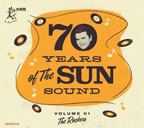
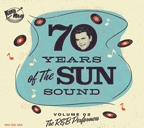 Sun Records of Memphis, Tennessee is the label, more than any other, that was responsible for the emergence of white rock ‘n roll. But it all started with the blues, as former radio announcer and visionary Sam Phillips set up the first permanent studio in Memphis in 1950 to record the myriad local blues, rhythm ‘n’ blues and country and western performers, including Howlin’ Wolf, B.B. King and Jackie Breston on spec for labels like Chess and Modern. In February 1952, the Sun Record Company began. Both thirty track CDs here are in chronological year order from 1953 through to 1963, with the recordings shuffled around to balance the sound and style. The concept is focused mainly on titles released on 78 and 45 RPM singles alongside a few album tracks. German Dee Jay and set compiler Mark Armstrong astutely comments “Sam’s various studios captured the energy of the artists while additionally showcasing the laudatory production skills of Phillips and his associate producers.” Volume 1, showcasing mostly little-known artists, begins with Earl Peterson’s up-tempo “Boogie Blues” (his only Sun single from 1954) followed by Hardrock Gunter’s rave-up “Gonna Dance All Night” and closes with Jerry Lee Lewis’ 1962 rocking recall of Chuck Berry’s “Sweet Little Sixteen” and David Houston’s jumping “Miss Brown” with room between for plenty of sides by other near unknowns (save Jerry Lee, Carl Perkins and Charlie Rich) like Smokey Joe and The Clyde Leoppard Band (“Listen To Me Baby”), bad-boy Jerry McGill and The Topcoats with their hard-driving “Lovestruck” (Armstrong comments: “His criminal offenses include being arrested 97 times in Memphis on charges ranging from public drunkenness to armed robbery”) and Harold Dorman’s salute to “Uncle Jonah’s Place,” that sounds like an insinuating meld of country music and Gary U.S. Bonds. Imagine. Further numbers by the likes of Barbara Pittman, Charlie Feathers, Hayden Thompson, Alton and Jimmy, Carl McVoy and The Miller Sisters also impress. For my money, the four titles by Rosco Gordon (a romping “Love For You Baby,” a Clarence “Frogman” Henry-influenced “Shoobie Oobie,” a wilder than wild “Cheese And Crackers“ and the rockabilly rocker “Sally Jo”) are the highlights of Volume 2 along with “Bear Cat” and “Tiger Man” by Rufus “Hound Dog” Thomas, “Chicago Breakdown” and “Boogie Disease” by Doctor Ross and “Hold Me In Your Arms” and “My Baby” by James Cotton. Also noted are sides by Willie Nix (“Baker Shop Boogie, Hot Shot Love - a feisty “Harmonica Jam”), Sammy Lewis and Willie Johnson with their blues rocker “I Feel So Worried” and four emblematic songs by Billy “The Kid” Emerson—“The Woodchuck,” “Move Baby Move” “Red Hot” and “Something For Nothing.” Music from the past, in black and white, with a remastered sound that will shake your speakers!—Gary von Tersch
Sun Records of Memphis, Tennessee is the label, more than any other, that was responsible for the emergence of white rock ‘n roll. But it all started with the blues, as former radio announcer and visionary Sam Phillips set up the first permanent studio in Memphis in 1950 to record the myriad local blues, rhythm ‘n’ blues and country and western performers, including Howlin’ Wolf, B.B. King and Jackie Breston on spec for labels like Chess and Modern. In February 1952, the Sun Record Company began. Both thirty track CDs here are in chronological year order from 1953 through to 1963, with the recordings shuffled around to balance the sound and style. The concept is focused mainly on titles released on 78 and 45 RPM singles alongside a few album tracks. German Dee Jay and set compiler Mark Armstrong astutely comments “Sam’s various studios captured the energy of the artists while additionally showcasing the laudatory production skills of Phillips and his associate producers.” Volume 1, showcasing mostly little-known artists, begins with Earl Peterson’s up-tempo “Boogie Blues” (his only Sun single from 1954) followed by Hardrock Gunter’s rave-up “Gonna Dance All Night” and closes with Jerry Lee Lewis’ 1962 rocking recall of Chuck Berry’s “Sweet Little Sixteen” and David Houston’s jumping “Miss Brown” with room between for plenty of sides by other near unknowns (save Jerry Lee, Carl Perkins and Charlie Rich) like Smokey Joe and The Clyde Leoppard Band (“Listen To Me Baby”), bad-boy Jerry McGill and The Topcoats with their hard-driving “Lovestruck” (Armstrong comments: “His criminal offenses include being arrested 97 times in Memphis on charges ranging from public drunkenness to armed robbery”) and Harold Dorman’s salute to “Uncle Jonah’s Place,” that sounds like an insinuating meld of country music and Gary U.S. Bonds. Imagine. Further numbers by the likes of Barbara Pittman, Charlie Feathers, Hayden Thompson, Alton and Jimmy, Carl McVoy and The Miller Sisters also impress. For my money, the four titles by Rosco Gordon (a romping “Love For You Baby,” a Clarence “Frogman” Henry-influenced “Shoobie Oobie,” a wilder than wild “Cheese And Crackers“ and the rockabilly rocker “Sally Jo”) are the highlights of Volume 2 along with “Bear Cat” and “Tiger Man” by Rufus “Hound Dog” Thomas, “Chicago Breakdown” and “Boogie Disease” by Doctor Ross and “Hold Me In Your Arms” and “My Baby” by James Cotton. Also noted are sides by Willie Nix (“Baker Shop Boogie, Hot Shot Love - a feisty “Harmonica Jam”), Sammy Lewis and Willie Johnson with their blues rocker “I Feel So Worried” and four emblematic songs by Billy “The Kid” Emerson—“The Woodchuck,” “Move Baby Move” “Red Hot” and “Something For Nothing.” Music from the past, in black and white, with a remastered sound that will shake your speakers!—Gary von Tersch
Kathy Murray and the Kilowatts
Fully Charged
Blue Heart Records 2022
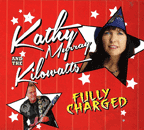 Vocalist Kathy Murray has been a popular fixture of the Austin music scene for decades, and she has earned her credentials sharing the stage with Albert Collins, Bobby “Blue” Bland, Koko Taylor, and Albert King and playing innumerable gigs. Along the way she has garnered Grammy and Blues Music Award nominations. This is her fifth release, and her fourth with the Kilowatts, which is comprised of guitarist Bill “Monster” Jones, drummer Richard Ross, and bassist Michael DeSantis. A few other colleagues sit on some of the fourteen songs which constitute this lively set.
Vocalist Kathy Murray has been a popular fixture of the Austin music scene for decades, and she has earned her credentials sharing the stage with Albert Collins, Bobby “Blue” Bland, Koko Taylor, and Albert King and playing innumerable gigs. Along the way she has garnered Grammy and Blues Music Award nominations. This is her fifth release, and her fourth with the Kilowatts, which is comprised of guitarist Bill “Monster” Jones, drummer Richard Ross, and bassist Michael DeSantis. A few other colleagues sit on some of the fourteen songs which constitute this lively set.
One of the bluesmen Murray most admires is the late Freddie King, and the longest song of the nearly hour-long set is “The House That Freddie Built.” Percolating organ by guest Lewis Stephens bolsters the locked-in rhythm section, and Jones provides stinging single note guitar leads around Murray’s vocal. Guest pianist Matt Farrell ushers in “Changing Lanes,” a rocker with some familiar tropes applied effectively: “I was traveling in the fast lane/Driving away the pain/I put the pedal to the metal/Down hard-luck highway.”
The renowned Texas Horns – trumpeter Al Gomez and saxophonists Kaz Kazanoff and John Mills– lend a hand on four tunes. One of them, “Breakup Breakdown,” exudes a 1950s vibe reflecting two other of Murray’s influences: country music, and The King of rock-and-roll, Elvis Presley. Speaking of which: one of the three cover versions in this set is “Suspicion,” recorded in the early 1960s by Elvis and Terry Stafford (and probably others). The Kilowatts add some creative syncopation to those earlier versions.
Another cover is the classic “It Hurts Me Too,” more readily associated with its treatment by legendary slide guitar master Elmore James than the rendition by its composer, Tampa Red. Jones acquits himself well on this one, although the track loses rhythmic zest. A similar slow pace is deliberate on the following number, the cover, “Anyone Who Knows What Love Is,” and the track reveals the occasional shortcoming of Murray’s vocals: a little languorous, and not quite pitch-perfect. To me, Kathy sounds best on uptempo numbers; witness the fervid rocker “Get Ahold of Yourself,” propelled by DeSantis’s thrumming bass. The set concludes on a pleasing note with “Extra Nice,” one of several tracks where Jones “Fully Charged” presents a band fully comfortable with its Texas blues style honed during years in the trenches.—Steve Daniels
Bob Corritore & Friends
Down Home Blues Revue
Vizztone/SWMAF CD
Louisiana Red & Bob Corritore
Tell Me ‘Bout It
Vizztone/SWMAF CD
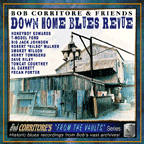
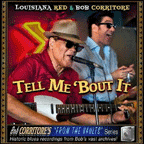 When 25-year-old Bob Corritore relocated from Chicago to Phoenix, Arizona, in the late 1980’s he never expected to be giving birth to a Southwestern mecca for the blues—it just worked out that way. Bob was soon joined by his longtime running buddy, Louisiana Red, and before very long they were playing all over town. Ace drummer Chico Chism quickly followed the pair out West and soon thereafter Bob began doing a weekly blues radio show. In 1991 he opened the now storied blues club the Rhythm Room booking his favorite artists and, when possible, organizing off-the-cuff recording sessions afterwards where he captured numerous amazingly diverse performances that are now accessible on his ongoing From The Vaults series. The Revue album features knock-out performances by Honeyboy Edwards (a stunning revival of Robert Lockwood’s “Take A Little Walk With Me”), T-Model Ford (two tracks—“Mean Old Frisco” and “I Asked For Water”), Henry Townsend ( with his ruminative original “Nothing But The Blues”) Big Jack Johnson ( with a bleak “Bluebird Blues”), Robert “Bilbo” Walker (with three tracks highlighted by a smoldering cover of Muddy’s “Still A Fool”), Smokey Wilson (with his insinuating “Didn’t Know What I’m Gonna Do”), Tomcat Courtney (reading “Clara Mae” the riot act), Dave Riley (with his autobiographical “Home In Chicago”), Pecan Porter (with an inventive take on Wilbert Harrison’s “Let’s Work Together”) and Al Garrett (lamenting that “My Money Done Run Out.” A fine, often powerful release—well worth checking out! Tell Me ‘Bout It focuses on the musical chemistry and abiding friendship of the two bluesmen who first met at the Delta Fish Market in Chicago in the summer of 1981, where they performed as a duo for the first time. Red didn’t last in Arizona very long as he relocated to Europe—but the rapport continued and in 2000 Red began touring the United States annually, always stopping in Arizona to visit, perform and record with his friend. The eleven self-penned and well-crafted songs here come from seven different recording sessions between 2000 and 2009. Red passed away Feb. 25, 2012. A gallery of musicians in the various formidable backup bands are also present and accounted for—from Chico Chism, David Maxwell, Bob Margolin, Little Victor’s Juke Joint and Buddy Reed to Chris James & Patrick Rynn, Brian Fahey and Johnny Rapp. Throughout, Red’s strikingly devastating vocals and hard-hitting guitar work are solidly reinforced by Bob’s scintillating harmonica playing that soulfully connects the dots, forming a compelling combination that draws the listener into Red’s often painful yet unerringly buoyant life experiences and psyche. Picks include the autobiographical working-man blues testimonial “Mary Dee Shuffle,” the moody, downbeat “Bernice Blues” (where the interplay between the duo is penetratingly transfixing), a couple of great train songs (“Freight Train to Ride” and “Alabama Train”) and a ruminative “New Jersey Blues.” Long live Louisiana Red! More please.—Gary von Tersch
When 25-year-old Bob Corritore relocated from Chicago to Phoenix, Arizona, in the late 1980’s he never expected to be giving birth to a Southwestern mecca for the blues—it just worked out that way. Bob was soon joined by his longtime running buddy, Louisiana Red, and before very long they were playing all over town. Ace drummer Chico Chism quickly followed the pair out West and soon thereafter Bob began doing a weekly blues radio show. In 1991 he opened the now storied blues club the Rhythm Room booking his favorite artists and, when possible, organizing off-the-cuff recording sessions afterwards where he captured numerous amazingly diverse performances that are now accessible on his ongoing From The Vaults series. The Revue album features knock-out performances by Honeyboy Edwards (a stunning revival of Robert Lockwood’s “Take A Little Walk With Me”), T-Model Ford (two tracks—“Mean Old Frisco” and “I Asked For Water”), Henry Townsend ( with his ruminative original “Nothing But The Blues”) Big Jack Johnson ( with a bleak “Bluebird Blues”), Robert “Bilbo” Walker (with three tracks highlighted by a smoldering cover of Muddy’s “Still A Fool”), Smokey Wilson (with his insinuating “Didn’t Know What I’m Gonna Do”), Tomcat Courtney (reading “Clara Mae” the riot act), Dave Riley (with his autobiographical “Home In Chicago”), Pecan Porter (with an inventive take on Wilbert Harrison’s “Let’s Work Together”) and Al Garrett (lamenting that “My Money Done Run Out.” A fine, often powerful release—well worth checking out! Tell Me ‘Bout It focuses on the musical chemistry and abiding friendship of the two bluesmen who first met at the Delta Fish Market in Chicago in the summer of 1981, where they performed as a duo for the first time. Red didn’t last in Arizona very long as he relocated to Europe—but the rapport continued and in 2000 Red began touring the United States annually, always stopping in Arizona to visit, perform and record with his friend. The eleven self-penned and well-crafted songs here come from seven different recording sessions between 2000 and 2009. Red passed away Feb. 25, 2012. A gallery of musicians in the various formidable backup bands are also present and accounted for—from Chico Chism, David Maxwell, Bob Margolin, Little Victor’s Juke Joint and Buddy Reed to Chris James & Patrick Rynn, Brian Fahey and Johnny Rapp. Throughout, Red’s strikingly devastating vocals and hard-hitting guitar work are solidly reinforced by Bob’s scintillating harmonica playing that soulfully connects the dots, forming a compelling combination that draws the listener into Red’s often painful yet unerringly buoyant life experiences and psyche. Picks include the autobiographical working-man blues testimonial “Mary Dee Shuffle,” the moody, downbeat “Bernice Blues” (where the interplay between the duo is penetratingly transfixing), a couple of great train songs (“Freight Train to Ride” and “Alabama Train”) and a ruminative “New Jersey Blues.” Long live Louisiana Red! More please.—Gary von Tersch
Bernard Allison
Highs & Lows
Ruf Records 2022
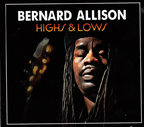 Not yet sixty but already into his fourth decade of blues recording, Bernard Allison continues to do honor to his family heritage. His father, of course, was the revered Blues Hall of Famer Luther Allison. A guitarist himself since his youth, Luther’s youngest son Bernard had stints in the bands of Koko Taylor and then his dad before embarking on his own solo career, much of it from a base in Europe. “Highs & Lows” represents his lusty emergence from pandemic down-time, in coordination with eminent producer Jim Gaines.
Not yet sixty but already into his fourth decade of blues recording, Bernard Allison continues to do honor to his family heritage. His father, of course, was the revered Blues Hall of Famer Luther Allison. A guitarist himself since his youth, Luther’s youngest son Bernard had stints in the bands of Koko Taylor and then his dad before embarking on his own solo career, much of it from a base in Europe. “Highs & Lows” represents his lusty emergence from pandemic down-time, in coordination with eminent producer Jim Gaines.
The eleven tracks benefit from the ensemble contributions of rhythm guitarist Dylan Salter, drummer Steve Potts, and bassist George Moye. Keyboard extras are courtesy of Toby Lee Marshall, and saxophonist Jose Ned James provides very tasty horn additions. Bernard penned or co-wrote all the songs, save for two covers of Luther’s tunes.
Bernard Allison is one of the contemporary bluesmen who refuse to be restricted by orthodox views of the genre. In addition to elements of rock and soul, his music incorporates funk, putting him in a class with other contemporary bluesmen such as Chris Thomas King, Eric Gales, and Cedric Burnside. The funk tendency is evident from the opening track, “So Excited,” which expresses Bernard’s joy at being back to music-making; his strong and slightly reedy vocal fronts his barrage of rapid guitar runs, over pulsating drums and bass. Tempo subsides in the following title track, with a syncopated rhythm section; then comes “Strain on My Heart,” a ballad distinguished by a lovely Jose James saxophone solo.
Among two notable guests of the set is Canadian guitarist Colin James, who shares vocal and lead guitar parts with Bernard on “My Way or the Highway,” an engaging shuffle with some dazzling guitar work by both principals. On “Side Step” Bernard proves that he can expertly handle a slow blues, with more of his own scintillating lead guitar. Then “Hustler” makes fine use of the set’s other guest, Bernard’s godfather Bobby Rush. Now 88 years old and still in his prime, Rush proves definitively that his middle name must be Funk, with a sly vocal and nice harmonica interplay with James’s sax.
Following are the two Luther Allison covers, “Now You Got It” and “I Gave It My All”; both are “funkified,” and in the latter Bernard croons effectively over James’s sax and Marshall’s organ. “My Kinda Girl,” “Satisfy Her Needs,” and “Last Night,” three more Bernard originals, hew to a mid-tempo groove and end the set on a vibrant and lively note. Of his over twenty albums, this is one of Bernard’s best.— Steve Daniels
Grant Dermody and Frank Fotusky
Digging in John’s Backyard
Self-produced 2022
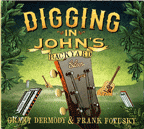 Since his last release, “My Dony,” in 2019 (which I reviewed positively for this publication), ace Seattle-based harmonica player Grant Dermody has teamed up for two recording sessions with equally talented acoustic guitarist Frank Fotusky, and the result is this stellar album of well-selected covers.
Since his last release, “My Dony,” in 2019 (which I reviewed positively for this publication), ace Seattle-based harmonica player Grant Dermody has teamed up for two recording sessions with equally talented acoustic guitarist Frank Fotusky, and the result is this stellar album of well-selected covers.
Dermody’s is probably the more recognizable name. Initially a lover of electric Chicago-style blues – into which he still delves regularly – during his three-decade career he has released several solo albums and collaborated with pianist Big Joe Duskin and eminent guitarists Honeyboy Edwards, John Dee Holeman, Robert Lowery, and (multiple times) Eric Bibb. He and Fotusky are also no strangers, but this is their first formal release as a duo. The project is dedicated to the late Piedmont area guitarist John Jackson, who was an influence, musical colleague, and personal friend of both Dermody and Fotusky.
Fittingly, one of the chosen covers is “Boats Up the River,” by Jackson. It exemplifies the gentle but lilting vibe of many of the tracks, and also benefits from the vocal harmonizing of the duo, a strength surprisingly not utilized in the rest of the set. However, in their individual singing each is more than competent, inhabiting a middle vocal range with conviction sans histrionics. On several tracks, the singing brings to mind that of Jorma Kaukonen…as does the adept guitar playing.
Every number is rewarding. There is a cover of “Peach Tree Blues,” composing attributed to Sonny Boy Williamson. (SBW I or II? An internet search locates several songs with the same title, with several composers…none of them a SBW.) Blind Blake’s “Police Dog Blues” and Charley Patton’s “Shake It and Break It” are given fine treatments, as is “Seattle Rainy Day Blues” by the late Piedmont guitarist John Cephas, who played on Dermody’s first two albums. (Dermody hails from Seattle.) Most notable for me are two slower and mournful blues. The first, “Hard Time Killing Floor Blues,” by Nehemiah “Skip” James is a poignant dirge treated as a spoken blues. The second, The Rev. Gary Davis’s “Death Don’t Have No Mercy,” covered many times by the myriad musicians influenced by that legendary country bluesman, is characterized by Fotusky’s subdued and sublime guitar and Dermody’s equally subdued and beautiful harmonica.
For appreciators of quality acoustic guitar and harmonica blues, this album will be one to enjoy repeatedly.— Steve Daniels
Jack Kerouac
100 Years of Beatitude
Bear Family 2CD
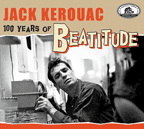 The original hitchhiking daddy-o of them all, American novelist and poet Jack Kerouac, was born in Lowell, Massachusetts in 1922 and, alongside William S. Burroughs and Allen Ginsberg, was a pioneer of the Beat Generation. He achieved boundless acclaim and notoriety with his second novel On The Road in 1957, which made him a beat icon who managed twelve more novels and numerous volumes of poetry before his early death, at age 47, from an abdominal hemorrhage caused by a lifetime of heavy drinking. Thematically, his work covered topics such as his Catholic spirituality, travel, jazz, promiscuity, life in New York City, drugs, Buddhism and poverty. This anniversary compilation features musicians that inspired the Beat poets Slim Gaillard, Dizzy Gillespie, Babs Gonzales and, most of all, Charlie Parker. It further includes music galvanized by their work—chiefly satirical, exploitative or dismissive. The two CDs also present spoken word recordings by the protagonists themselves, including Carl Sandburg. Also, you will be entertained by 1950s and 1960s comedians and actors inspired by the Beats and the healthy heritage of African American jiving. A 36 page, image-filled booklet with an extensive, informative essay by the esteemed Heinrich Rumptreiber puts everything in be-bop perspective—dig or be dug!—Gary von Tersch
The original hitchhiking daddy-o of them all, American novelist and poet Jack Kerouac, was born in Lowell, Massachusetts in 1922 and, alongside William S. Burroughs and Allen Ginsberg, was a pioneer of the Beat Generation. He achieved boundless acclaim and notoriety with his second novel On The Road in 1957, which made him a beat icon who managed twelve more novels and numerous volumes of poetry before his early death, at age 47, from an abdominal hemorrhage caused by a lifetime of heavy drinking. Thematically, his work covered topics such as his Catholic spirituality, travel, jazz, promiscuity, life in New York City, drugs, Buddhism and poverty. This anniversary compilation features musicians that inspired the Beat poets Slim Gaillard, Dizzy Gillespie, Babs Gonzales and, most of all, Charlie Parker. It further includes music galvanized by their work—chiefly satirical, exploitative or dismissive. The two CDs also present spoken word recordings by the protagonists themselves, including Carl Sandburg. Also, you will be entertained by 1950s and 1960s comedians and actors inspired by the Beats and the healthy heritage of African American jiving. A 36 page, image-filled booklet with an extensive, informative essay by the esteemed Heinrich Rumptreiber puts everything in be-bop perspective—dig or be dug!—Gary von Tersch
Mick Kolassa
Wasted Youth
Endless Blues Records 2021
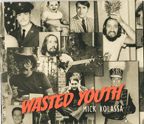 Known as Michissippi Mick (he’s a transplant from Michigan to Mississippi), Mick Kolassa is nothing if not productive. Since 2014 he has released at least one album annually. This one follows 2020’s successful “If You Can’t Be Good, Be Good at It.” That title revealed the droll humor present in many of his songs. Although it sports its share of chuckle-inducing lyrics, “Wasted Youth” is more subdued and introspective, understandable given its genesis during the pandemic year of 2020, during which Kolassa’s wife and several of his friends died. Many of the song titles reveal its focus: “It Hurts to Let You Go,” “Feeling Sorry for Myself,” “I’m Missing You,” “Darkness to Light.” Yet the set is cathartic and uplifting rather than morose.
Known as Michissippi Mick (he’s a transplant from Michigan to Mississippi), Mick Kolassa is nothing if not productive. Since 2014 he has released at least one album annually. This one follows 2020’s successful “If You Can’t Be Good, Be Good at It.” That title revealed the droll humor present in many of his songs. Although it sports its share of chuckle-inducing lyrics, “Wasted Youth” is more subdued and introspective, understandable given its genesis during the pandemic year of 2020, during which Kolassa’s wife and several of his friends died. Many of the song titles reveal its focus: “It Hurts to Let You Go,” “Feeling Sorry for Myself,” “I’m Missing You,” “Darkness to Light.” Yet the set is cathartic and uplifting rather than morose.
What remains consistent with Kolassa’s past releases is the exemplary musicianship and skilled songwriting. Kolassa is an aficionado of many blues genres; past albums have highlighted blues rock, acoustic blues, classical country blues, and even “bluesified” Beatles covers. The current album again provides versatility, while mainly presenting shuffles and ballads. Many of the usual collaborators are along for the ride, including bassist Bill Rufino, drummer James Cunningham, and keyboard man Rick Steff. Making brief return appearances are pianist Victor Wainwright and harmonicats Brandon Santini and Eric Hughes.
Ample praise is due lead guitarist and co-producer Jeff Jensen, who has collaborated symbiotically with Kolassa for almost a decade. Production values are excellent, and Jensen’s guitar playing is outstanding; his lead on the slow blues “It Hurts to Let You Go” is just gorgeous without being pretentious. Some further splendid guitar is dealt out by guest Anthony Paule on “I Can’t Get Enough,” a jaunty mid-tempo shuffle also featuring nifty keyboard work by Steff and a simmering horn section. Yet more guitar pleasure is found in the closing tune, the pensive “Edge of a Razor,” with interplay between three acoustic guitars: rhythm by Jensen, fingerpicking by Kolassa, and slide by guest Albert Castiglia.
Bassist Rufino is given time to shine on “I’m Missing You” and “Touching Bass,” and guest David Julia provides yet another display of guitar virtuosity on “Easy Doesn’t Live Here.” The dozen songs are all worthy, and all are originals except “Darkness to Light,” a medley combining tunes by War, Jesse Colin Young and the Youngbloods, and a venerable spiritual.
“Wasted Youth” again confirms that prolific Mick Kolassa can provide quantity without loss of quality.—Steve Daniels
The Nighthawks
Established 1972
Vizztone CD
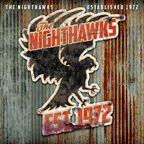 The Nighthawks, Washington D.C.’s storied road warriors of blues and roots music paint the town red with this 50th anniversary live-sounding album produced by the combo along with longstanding friend, David Earl, the owner of Severn Sound Studios in nearby Annapolis, Maryland. There the Hawks cranked out fourteen rocking, fervent tracks in the fabled Nighthawks tradition with founder, lead singer and harp-master Mark Wenner still at the helm while guitarist Don Hovey, bassist Paul Pisciotta and drummer Mark Stutso all share vocals and songwriting—making this cast one of the strongest ever. Much more than a bar or blues band, this is a chemistry-rich combo that back in the day played with Carl Perkins and Muddy Waters, to cite just a few. Choice cuts include a couple penned by Hovey (the easy rocking “You Seem Distant” and a laid-back acoustic gem titled “Driving”), a vicious version of the reggae classic “Johnny Too Bad,” the soulfully appealing “West Memphis” and a down-to-earth tale about “Gas Station Chicken.” Also noted are a couple of imaginative revamps—Mose Allison’s cautionary “Ask Me Nice” and a freewheeling rendition of the Coasters’ “Run Red Run.” Five star stuff!—Gary von Tersch
The Nighthawks, Washington D.C.’s storied road warriors of blues and roots music paint the town red with this 50th anniversary live-sounding album produced by the combo along with longstanding friend, David Earl, the owner of Severn Sound Studios in nearby Annapolis, Maryland. There the Hawks cranked out fourteen rocking, fervent tracks in the fabled Nighthawks tradition with founder, lead singer and harp-master Mark Wenner still at the helm while guitarist Don Hovey, bassist Paul Pisciotta and drummer Mark Stutso all share vocals and songwriting—making this cast one of the strongest ever. Much more than a bar or blues band, this is a chemistry-rich combo that back in the day played with Carl Perkins and Muddy Waters, to cite just a few. Choice cuts include a couple penned by Hovey (the easy rocking “You Seem Distant” and a laid-back acoustic gem titled “Driving”), a vicious version of the reggae classic “Johnny Too Bad,” the soulfully appealing “West Memphis” and a down-to-earth tale about “Gas Station Chicken.” Also noted are a couple of imaginative revamps—Mose Allison’s cautionary “Ask Me Nice” and a freewheeling rendition of the Coasters’ “Run Red Run.” Five star stuff!—Gary von Tersch
Home
/ Blues Blogs /
Artist Links / Blues
Links / Videos / Store
Subscribe / Advertise
/ Back Issues
/ Contact / Staff